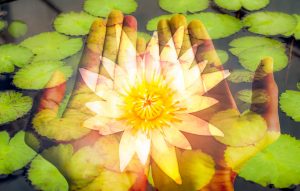 What I learned about Water Bears from author Jay Griffiths’ amazing article Dwelling on Earth makes walking meditation a whole new experience! Here is Jay’s wonderful writing:
What I learned about Water Bears from author Jay Griffiths’ amazing article Dwelling on Earth makes walking meditation a whole new experience! Here is Jay’s wonderful writing:
Smaller than even a grain of sand is the water bear, a pioneer who inhabits new environments so that other invertebrates can then make themselves at home. They are found in almost every habitat on Earth, from tropical rainforests to the Antarctic, from mountain peaks to sea floors. This tiny creature, visible only through magnification, is also called the moss piglet, as it lives in films of water in mosses and lichens as well as sand dunes, soil, and leaf litter.
 Water bears, so-called for their barreling rolling gait, are more properly known as tardigrades, literally “slow-steppers”: not for them the speed of a rocket launch. Slow and ancient, they are thought to be some 530 million years old. About half a millimeter in length, they are short and chubby with eight legs, and many have pigment-cup eyes and sensory bristles. They can survive cold at minus 272 degrees Celsius (520°F) and heat at over 150 degrees Celsius (300°F). They can go ten years without water and thirty years without food, drying out until they are only about 3 percent water. (When they get water, they rehydrate and reproduce.) They can withstand pressure up to 1,200 times atmospheric pressure and can suspend their metabolism, entering “cryptobiosis.” They have survived Earth’s first five mass extinctions and are the first known animal to survive in outer space—on the outside of a space rocket.
Water bears, so-called for their barreling rolling gait, are more properly known as tardigrades, literally “slow-steppers”: not for them the speed of a rocket launch. Slow and ancient, they are thought to be some 530 million years old. About half a millimeter in length, they are short and chubby with eight legs, and many have pigment-cup eyes and sensory bristles. They can survive cold at minus 272 degrees Celsius (520°F) and heat at over 150 degrees Celsius (300°F). They can go ten years without water and thirty years without food, drying out until they are only about 3 percent water. (When they get water, they rehydrate and reproduce.) They can withstand pressure up to 1,200 times atmospheric pressure and can suspend their metabolism, entering “cryptobiosis.” They have survived Earth’s first five mass extinctions and are the first known animal to survive in outer space—on the outside of a space rocket.
 It seems like a parable. Yes, the water bears survived exposure to the vacuum of outer space without the protection of atmosphere, but they did so by entering their own death-zone. As soon as they arrived back on Earth, they rehydrated in delirious relief with the water of life, and then reproduced. Every scrap of life is eager to thrive in the one place where it can, living between two skins: the tissue of soil and the delicate skein of the ozone layer. Here is where life flourishes, in or on the soil, the source of our nourishing in every sense.
It seems like a parable. Yes, the water bears survived exposure to the vacuum of outer space without the protection of atmosphere, but they did so by entering their own death-zone. As soon as they arrived back on Earth, they rehydrated in delirious relief with the water of life, and then reproduced. Every scrap of life is eager to thrive in the one place where it can, living between two skins: the tissue of soil and the delicate skein of the ozone layer. Here is where life flourishes, in or on the soil, the source of our nourishing in every sense.














